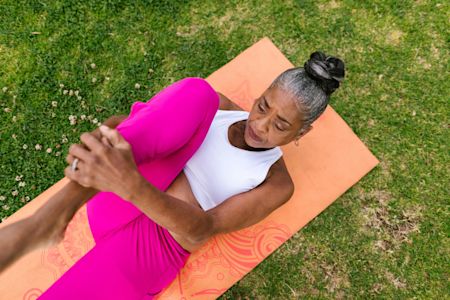Introducing Activate, my brand-new animation for kids
Starring me and my brilliant Activators, it's designed to get kids moving and having fun.
Save £80 and feel fitter, healthier and happier – together.

In this guest blog, Arthritis Action Services Manager and Dietitian, Martin Lau - who is also a Strength and Conditioning Coach - talks about the benefits of exercise for people who have arthritis.
Many people have heard of arthritis, but not everyone knows exactly what is happening in the body, or how it affects people's day-to-day lives.
The word "arthritis" actually means inflammation in the joints. Inflammation can be thought of as being like a bruise with swelling on the inside of the joints, and this can cause pain and stiffness to the affected area.
The most common type of arthritis affecting people is osteoarthritis, sometimes referred to as wear-and-tear arthritis which typically affects the knees, hips and spine.
There are other types, too. Inflammatory arthritis - including rheumatoid arthritis, psoriatic arthritis and axial spondyloarthritis - occurs when the immune system attacks the joints and spine and causes pain, stiffness, swelling and gout which is caused by crystals of uric acid irritating the joints.
There are thought to be 10 million people with some form of arthritis in the UK. That's equal to 1 in 6 people living with the pain it causes - so, if you're not affected yourself, you probably know someone who is.
By 2050, it's estimated 1 in 3 of the world's population will have osteoarthritis and this increase isn't just down to ageing populations. Modern lifestyles are seeing people present with osteoarthritis at a younger age and this is impacting on work, the economy and the NHS as well as individuals themselves.
Why is this? Well, 64% of the UK population aged 15 and over is classed as overweight or obese. Obesity is the major risk factor for osteoarthritis other than age – so it is no surprise that as obesity rates rise, osteoarthritis rates also rise.
One of the most frequently asked questions at Arthritis Action is, "Will exercise make my arthritis worse?".
Regular physical activity, exercise and movement form a big part of managing the condition – and even small increases in your level of activity can have a large benefit on your health and wellbeing. Exercise will not do any harm to your joints, and there is even evidence that exercise can reduce swelling in inflamed joints.
There are many more benefits to increasing your level of activity, too: exercise can calm the mind and help improve sleep quality, concentration and mood - all things that can be impacted when you have arthritis. In some, increasing activity levels can fundamentally improve the ability to live independently. For example, leg strength and balance can make using stairs, going to the shops, or using the toilet easier.
Regular exercise can also help in maintaining a healthy weight, decreasing the load on joints and, in turn, making them less painful.
When you first start out increasing your levels of exercise if you have arthritis, you may feel a temporary increase in discomfort or stiffness. This is normal and will likely settle after a day or so.
One of our volunteers, Graham, has arthritis and said exercise is key for him in managing the condition. "I love my sports, but I have to make sure I include some gentle exercise. Stretching is very important along with making sure I stay hydrated and maintain a healthy diet," he said. "Self-management means taking control and finding what works for me."
If you're not confident to begin an exercise programme on your own, a clinical practitioner, such as a physiotherapist or osteopath, can give advice. In some areas, your GP may be able to refer you to a local health centre for subsidised exercise sessions where you can get support from a personal trainer or gym instructor until you have the confidence to continue on your own. Ask your GP for more details.
Arthritis Action is a source of information on the many ways you can help arthritis through self-management techniques such as diet, weight management and exercise. Free resources, factsheets and more can be found on our website www.arthritisaction.org.uk.